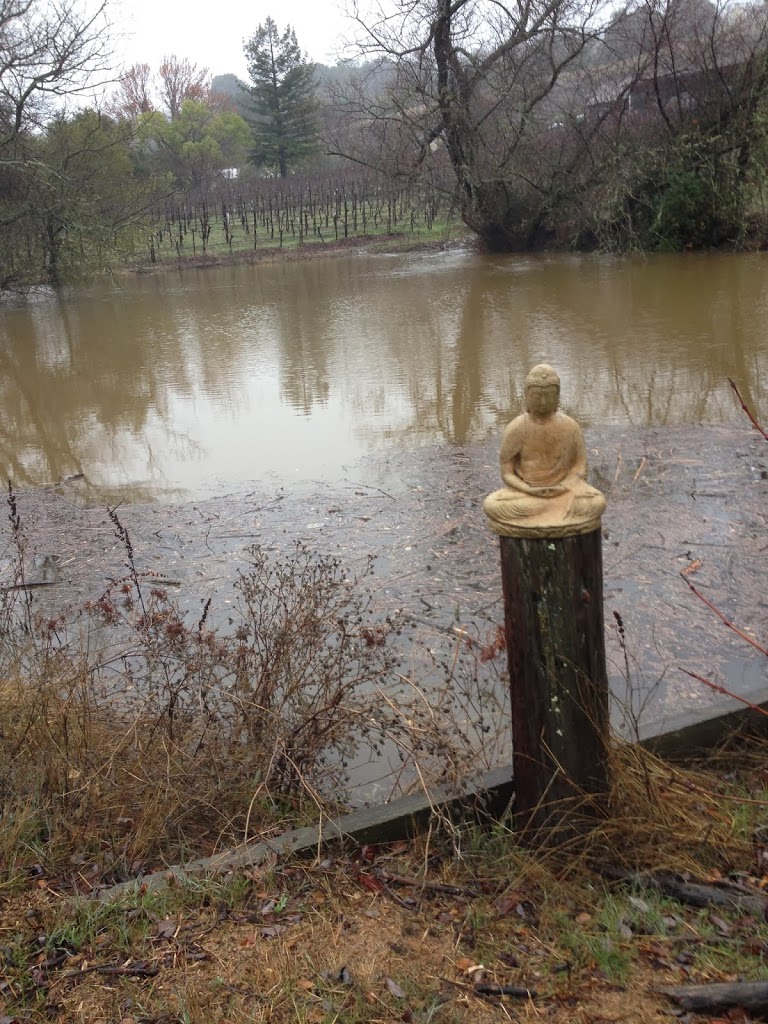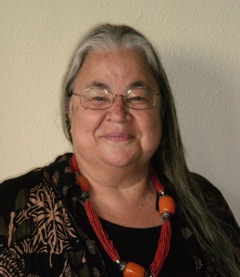| Charlie Toledo, Executive Director |
Charlie Toledo, Executive Director of the Suscol Intertribal Council in Napa, CA, spoke with me last week about the drought and the water situation in California. This is part four of that interview.
Charlie helped author the Watershed Development plan for Napa County in its seminal years, 1992-1995, and more recently serves on the State Low Income Oversight Board, a committee of the California Public Utilities Commission. For more than 30 years, she has served as peace activist, community organizer, and healer, dedicated to preserving Native American culture and building the cohesiveness of indigenous groups in the Napa area.
Farmer as Quintessential
Patricia: You talk about the importance of behavior modification in any plan around water.
Charlie: Yes. Industrialized nations need major behavior modification around water issues. The idea that water is free to use as determined in industrial technological and agricultural whims is not sustainable!
Patricia: What behaviors do we need to change?
Charlie: Like I said at the UN on the international level, I was not in a place to participate. I was just shocked. I was so shocked at the silence that I left the meeting. It was frightening. Because, what I was thought was an eminent California state problem, was in fact an eminent global problem. The good news about what we were talking about earlier about the climate change and moving into the next Ice Age, is this may be what saves us, the Ice Age.
Patricia: You mean there won’t be many of us left?
Charlie: There will probably be 50-60% survival rate. Humans lived through the last Ice Age and were adaptable. Again, talking about some of these technologies that we’re talking about, that’s what would save us.
Patricia: A practical question for you. How has your work with water changed your use of water?
Charlie: I’ve always been really conservative. I was born in New Mexico and New Mexico has always been in drought. Growing up within a semi-indigenous, agricultural family— and my father and my grandparents were all agricultural people— we were always really careful. We only took one bath a week. We would wash with a washcloth. Our clothes were only washed once a week. I’ve always kind of lived that way. I take a bath or a shower every other day. I don’t always flush my toilet.I try to recycle. I always wish that I would do something more.
I’ve been on the state Board since 2009, but it took me one year to understand how to work within the protocols. When you’re part of a political body it’s really hard to know how to say what you’re supposed to say and how you get it on the agenda. When is the appropriate time to ask a question. It can take a year to know how to do that. I’m more outspoken. I was doing it in less than a year, but my questions were being disregarded.
That brings us to behavior modification and what we need to change. I found that asking a question, the right question in the right place— can create change faster than a bunch of demonstrating in the streets, where you just look like rabble. Whereas, if you’re in the meeting and you’re at the table and even if you’re at the big podium asking, excuse me, could you please explain to me, I just don’t understand. Just like I did with that guy when I said, so you’re saying the riparian corridor is very important. Show us where the riparian corridor restoration is on this map?” He’s like, “Oh, it’s not there.”
That was more profound than anything I could have done. I could have tried to argue and started acting like I know and you don’t know and you’re so stupid. I just go, “Hey dude, I’m stupid, and could you explain to me?” Because, I am stupid and I don’t know everything, but I know what I know. When I was at that UN meeting, I just thought Holy God, this is really big! What I came to last night watching the weather is, what might put us back into balance is another Ice Age.
Patricia: There’s got to be a correction.
Charlie: Right. Humans have been trying save ourselves. I think even ten years ago people like those were part of Friends of the River were actually an economic group to develop the river like it’s being commercially developed now.
Patricia: They did that?
Charlie: They did that and we knew that. There’s a lot of people like that. There’s a lot of organizations like that. I call them honey pots. They’re set up to attract people that will help and want to do the right thing, and then they get stuck in there and then they’re immobilized. That’s what’s nice about being the director of your own organization or speaking as an individual; because, you don’t have to be controlled. Somebody can’t tell you can’t say that or this isn’t right or you’re not authorized. Napa County has gotten the watershed down, but I think the biggest thing that I’m pushing is conservation.
The replanting of trees, the restoration of the riparian corridor and conservation. Massive conservation beyond what anybody could imagine.
 |
| Overflow of small pond at our ranch in a recent, precious rain. |
Patricia: Conservation of?
Charlie: Of water. Treating water like gold. Stop flushing it down the toilet. Recycling all the gray water within the household. Collecting rainwater off the roof. Re-establishing the marshes and wetlands which were actually what held the water in place, allowed the aquifers to replenish water. What they’re doing and this happened in Los Angeles, is they decided to fill an empty aquifer with water so it would be a backup storage. Well, they took the Bay Delta Water, stored it in Ventura. When they went in to see how it was doing, the water was gone. They said somebody stole the water.
There might have been a crack in the aquifer, who knows? The aquifer is like taking an empty lake and pouring water into it. Anyway, we’re in a place where I think what will happen, because humans adapt, that we’ll adapt. We’re going to realize oops! We did it wrong! Maybe we’ll get it right.
Update: Charlie attended a conference sponsored by Water Education Foundation on February 20, 2014, two days after this interview. For 30 years the Water Education Foundation has been dedicated to providing in-depth, unbiased information about water. Charlie reported that the feeling at the conference was serious and cooperative, but many still were discussing ways of “throwing money at the problem” instead of considering changes that would bring environmental balance.
“The first panel was not talking of headwaters or trees and riparian corridors,” Charlie said. Again Charlie confronted this. “You are not talking about the fact the rivers are going dry,” she said. “You are not talking about the fact the water is gone! You are only talking of pumping more!”
A general feeling was that if the water was managed better it could sustain everyone.
Only one man from Friends of the River, when it was his turn on last panel, “Stakeholders,” spoke poetically during his short presentation. He said, “I don’t believe in magical thinking….” These discussions can be heard on this links:
https://www.youtube.com/watch?v=tNc9yw22ATg (Several videos on talks at the San Gabriel Valley Water Forum)
https://www.sustainabledelta.com/?gclid=CKL-xKyn3rwCFUiGfgodRlgACQ (more updates on the water situation in California and the Delta)
Patricia: You said that the current director of the Water Education Foundation is working on having native people on each of the committees. What do native people bring to the table that others do not?
Charlie: Native perspective brings the headwater issues to table— plus Senior rights. They talk of Senior & Junior rights as to who claimed water first. Senior gets 1st priority to water, then Junior, and some have no status as such. In 1986 Natives at headwaters were granted Senior rights. Many tribes do not know how to access or excerpt that “privilege.”
The other point Native Americans bring to the table is water as a living entity. ONE WATER, ONE AIR, ONE EARTH! All water is connected, not just a commodity to be marketed. Rivers are living beings with a total ecosystem that is living, thriving breathing life! The reintroduction of wolf from Yellowstone’s parks illustrates that perfectly!
Charlie spoke w/Tim Foster, Executive Director, after conference who said that they tried to get Native Americans to speak on the panel but were unsuccessful. He was grateful for Charlie’s offer to help facilitate that in future conferences. He thanked her for adding to the discussion about trees and restoration of riparian corridors of water ways.
A current project at Suscol Intertribal Council, a 501(c)3 organization, focuses on building “Suskol House”, a spiritual center for Native American peoples in Pope Valley. The land is bought and the construction begins in April, 2014. If you appreciate the work of Charlie Toledo in developing a healthy relationship to our waterways informed by native wisdom and current science, please consider making a tax deductible donation to the building of this unique structure, a model for use of materials and sustainability. For more info and to make your donation, watch this video.
